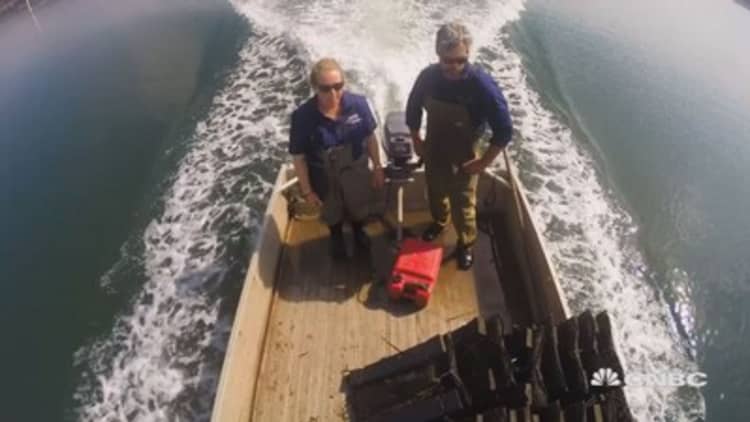An experimental farm showcasing Israeli agriculture technology is in the planning stages outside Wagga Wagga. And no, for those not in the know, that's not in Africa, nor in India, whose Prime Minister, Narendra Modi, is this week in Israel, among other things to discuss agriculture cooperation. It's in Australia.
"That a country that is the seventh largest exporter of food in the world, being Australia, could learn something from a country as small as Israel on agricultural technology does raise the eyebrows for a few people," admits Ben van Delden, head of marketing and 'ag-tech' point man at KPMG Australia in a phone interview.
It may sound counterintuitive that many of the most promising Israeli ag-tech startups are actually concentrating, at least at first, on the very developed markets in places like Australia, the U.S. and Europe. While Israel and India also eye intense agriculture cooperation, it's often different in nature.
"The technology that Israel offers a market like Australia will be very different from the almost agricultural aid that goes to a market like India," says van Delden. That's not necessarily because of different technological levels but because of the difference in the way agriculture is practiced and different infrastructure and commercial challenges.
For van Delden a trade mission trip to Israel came as an eye-opener. More even than high-level science, which Australia and for that matter many other countries also have, he concluded that it was a matter of mentality: "Dial up the Chutzpah", he called a report he wrote that appeared early 2017.
"That audacity, that chutzpah, we were very interested in. If we can take an ounce of that and apply it to a country with the scale of land like Australia … Think of the potential," he enthuses.
One area where a cackle of Israeli companies is concentrating on is monitoring, sensing and analysis networked systems that give farmers timely, detailed information on their crops and warnings of what needs to be done, often delivered to their phones, tablets or laptops. It's called precision farming and the market is estimated to be worth close to $11 billion by 2025, according to a Grand View Research report from earlier this year.
Even the company that developed the system at the heart of the country's Iron Dome missile defense system, mPrest, is branching out into precision agriculture. And there are companies such as Taranis, which is active in markets far and wide, including the U.S., Russia, Argentina and, indeed, India.
A relative newcomer is CropX, which is a company that not only produces the software but also purpose-made soil sensors, which it says can easily be placed by growers. It's in its first year of being applied commercially and has chosen to do so in developed markets such as the U.S. and Europe, says CEO Tomer Tzach.
He explains why many startups first look at Western markets: "Realistically speaking, it's a matter of priority and complexity, the path of the least resistance, low-hanging fruit etc."
In the U.S., his system, which is initially concentrating on irrigation information, is being applied even in the home-state of Silicon Valley, California, where drought is a problem. But the main target is the "broadacre" mass market in the central U.S., where huge acreages are planted with corn, soy beans, alfalfa, wheat etc.
"This mass market is totally underserved when it comes to sensing technologies. Because they need a solution for such large acreages that is inexpensive and very simple and risk free," says Tzach. Eventually, though, he has the ambition to be active worldwide.
CropX will roll out a new product later this year that will expand its system to include crop protection and fertilization. Tzach explains Israel's ability to penetrate even the most developed agriculture markets in two ways: Israel's arid and sometimes adverse conditions and the technologies developed in the army.
"We're taking advantage of many Israeli technologies that are coming out of the military. My hardware developer was actually in the military unit that creates hardware for special operations."
Another company that operates for now mainly in the developed markets is Prospera. Its system, which involves machine learning, connects to a range of sensing and imaging tools via the cloud, which growers can access on their mobile phones or any other platform.
Daniel Koppel, the company's co-founder and CEO, explains its strategy; "There's a combination of different factors for our geographies but one would definitely be the technological maturity. For us as a company it's probably less risk-taking to start with more tech-mature companies," he says.
It's a well-trodden startup path but Koppel too eventually hopes to reach less developed markets, where the system can have an even bigger impact: "Now we work with growers that are reaching 70 percent [of capacity] and we're helping them to get to 90-95. I think in developing countries we can help them with a much bigger jump and they can get all the way to 90 percent."

Meanwhile in Australia, the experimental farm outside Wagga Wagga is meant to address one problem that KPMG's van Delden has identified that can beset Israeli technology: It doesn't always take into account local circumstances.
"The moment you move away from greenhouse technologies and into more open field at scale or open field livestock systems, you tend to find that the deep thinking around 'would that product work in a market like Australia' hadn't been thought through," he says. "Ag-tech cannot be designed in isolation from the end-market."
But in that sense Israel is way ahead in India compared to Australia. The India-Israel Agriculture Project has set up 15 joint centers of excellence in India since 2008, with another 11 due to open in early 2018. More cooperation, including setting up a joint agriculture and water fund, is being discussed during Modi's visit.




